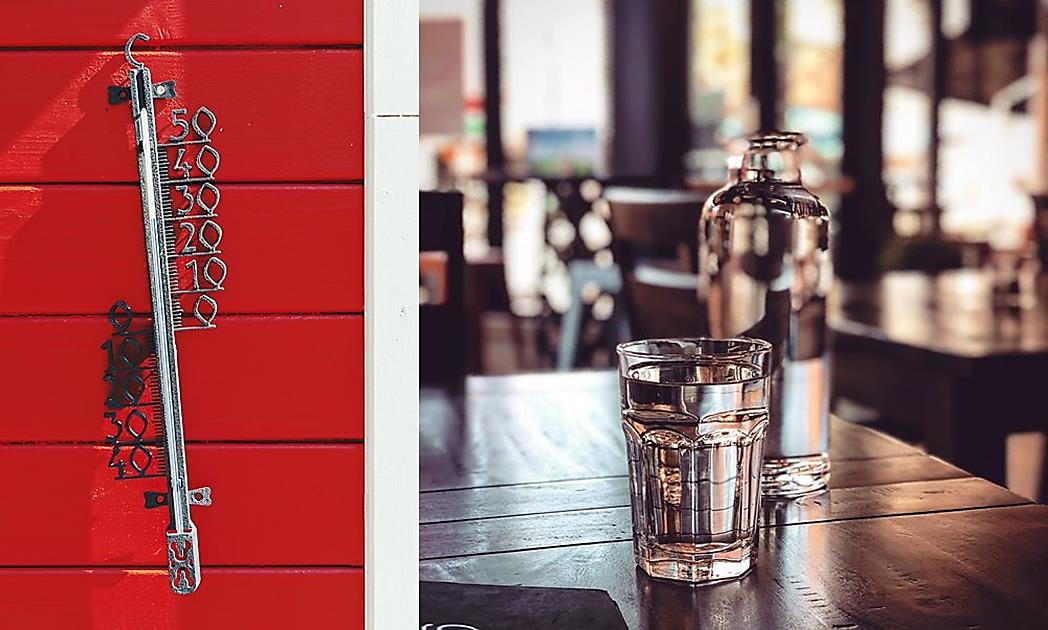
by Fern Shaw | Jul 23, 2019 | bottle fed water coolers, Water Coolers
Do you know how to keep yourself properly hydrated during a heatwave? With the temperatures set to soar this week, here at AquAid Water Coolers we have compiled a checklist to help you keep cool and hydrated wherever you are:
In the workplace:
- Stay hydrated! Set an alarm clock on your pc, laptop or mobile to make sure that you visit the water cooler as often as needs be to replenish your drinking water.
- Chill your wrists: Run cold water over your wrists for 20 to 30 seconds every hour. Try not to do this using the cool water from the water cooler – it’s messy and I doubt the water cooler station is meant to be used as a private bathing area. Rather use the taps in the bathroom.
- Drink cool (but not icy cold) liquids to help lower your body temperature. The water cooler station is perfect for this.
- Turn off electronics: If they’re not being used, unplug electronic devices to keep them from generating unnecessary heat.
At home:
- Chill your wrists: Run cold water over your wrists for 30 seconds or so every hour:
- Stay hydrated! Kids may not feel thirsty, but it’s essential to stay hydrated, so make sure young ones are getting lots of water. If you’re planning to leave the house, freeze your reusable water bottles and take them with you.
- Drink cool (but not icy cold) liquids to help lower your body temperature.
- Try to keep water refrigerated prior to drinking, if possible.
- Frozen flannel: Freeze a flannel and then plop it on the back of your and your family’s necks – instant refresher.
- Turn off electronics: If they’re not being used, unplug electronic devices to keep them from generating unnecessary heat.
- Don’t cook: Feed your family fresh foods such as salads and fruit. Not only will this cool the body’s core, it’ll also keep cooking-related heat from filling up the house.
- Postpone laundry: Plan to do heat-generating activities after the sun goes down. For example, do your laundry at night.
All around:
- Avoid the heat: stay out of the sun and if possible don’t go out between 11h00 and 16h00 (the hottest part of the day) if you’re vulnerable to the effects of heat.
- Have cool baths or showers, and splash yourself with cool water.
- Drink cold drinks regularly, such as water and fruit juice. Avoid tea, coffee and alcohol.
- Stay tuned to the weather forecast on the radio or TV, or at the Met Office website.
- Plan ahead to make sure you have enough supplies, such as food, water and any medications you need.
- Wear loose, cool clothing and a hat if you go outdoors.
- Check up on friends, relatives and neighbours who may be less able to look after themselves.
- People who have epilepsy or heart, kidney, or liver disease; are on fluid-restricted diets; or have a problem with fluid retention should consult a doctor before increasing liquid intake.
- If you’re sweating a lot, be quick to replace lost salts and minerals as well as water. Fruit juice or sports drinks with electrolytes are good choices, but do not take salt tablets unless directed to by your doctor. Taking calcium supplements, however, is a good idea.
- Drink cool (but not icy cold) liquids to help lower your body temperature. Try to keep water refrigerated prior to drinking, if possible.
It’s also good to bear in mind that wherever you require a temporary or permanent hydration solution in the UK, AquAid have a wide range of water coolers tailor-made to meet your requirements. We even offer a next day water delivery service for our Bottle-Fed Water Coolers.
Contact us today.

by Fern Shaw | Jul 2, 2019 | water cooler
Today, 01 July, is International Joke Day. From what I’ve seen online this seems to have produced the lamest jokes instead of those that produce that involuntary snort where you spray your first glass of water or morning cuppa all over your desk.
Perhaps a Monday is not the right day to spring such an event on the unsuspecting though – early Mondays are usually the reserve of tired brains and bodies. There is a solution though – one that will elevate you from ‘chicken crossing the road’ unfunnies to the lofty cerebral wit similar to those of your favourite comedian. All it takes is an increase in water intake, which means more visits to the water cooler.
- For the brain cells to function properly there needs to be a balance between water and various compounds.
- When we fail to drink enough water, this balance is disrupted and there is a decline in cognitive performance.
Also dehydration can cause neural pathways to shut down. As a result, the section of the brain responsible for planning and problem-solving starts struggling.
- There has also been research which shows that staying hydrated helps an individual’s brain to operate faster. Those who drink as little of 500ml of water prior to engaging in mental activities were 14% faster than those who did not drink. If you feel like your concentration is drifting, try drinking a glass of water and your brain will resume normal functioning within seconds.
- Another example of not drinking enough water is low mood swings. Think of it this way – there are two core factors that determine an individual’s mood: energy and motivation. Drinking enough water ensures that you stay energised and motivated.
Now that you’ve wrapped your Monday brain around this wit propulsion information, why not head off to your water cooler , replenish your water and improve the general Monday mood for yourself and your fellow office goers by delivering the best jokes they’ve heard.

by Fern Shaw | Jun 28, 2019 | mains fed water cooler
When the temperatures soar within a short time frame, it’s easy to forget something as simple as adjusting our water consumption to counteract what are most likely increased dehydration levels.
A thought that may help one adjust as the heat increases is to keep in mind that water not only makes up a significant percentage of every single bodily organ but each of our organs requires adequate water to function well.
Which is why, here at AquAid Water Coolers, we continue to encourage the implementation of good daily hydration habits, whatever the weather and wherever the location.
One of the simplest methods to ensure that you’re drinking enough water is to install a water cooler at your premises whether that’s in an office; building site; festival; concert hall; sporting or social event; hotel; medical facility; childcare facility; school; college or university.
If you would like to ensure that everyone in your organisation has easy access to refreshing drinking water, irrespective of the weather, contact us at AquAid. We supply a wide range of high quality Bottled and Mains-Fed water coolers and we have, for over two decades helped our more than 33,000 customers keep hydrated through the delivery of bespoke water supply solutions , tailor-made to meet the requirements of any organisation, be they small, medium or large.

by Belinda Ollewagen | Jun 19, 2019 | water cooler
The University of Warwick led a study to determine whether happy employees work harder, and as it turns out they do – in fact, they’re 12% more productive.
The study included four different experiments with more than 700 participants. During the experiments participants were shown either a comedy clip or treated to free chocolates, fruit and drinks; while others were questioned about recent family tragedies, to assess whether lower levels of happiness were later on associated with lower levels of productivity.
One of the researchers, Dr Sgroi, added: ‘The driving force seems to be that happier workers use the time they have more effectively, increasing the pace at which they can work without sacrificing quality.’
So what does this have to do with a water cooler you might ask?
Well, if we know that happier employees work harder and are more productive, then it stands to reason that we’ll want to encourage happiness wherever we can! And one of the things conducive to happiness is a healthy body, and one of the factors contributing to that, is ensuring we remain properly hydrated – ergo, regular visits to the office water cooler.
Many companies provide additional perks like gym memberships and healthcare plans, but if you’re not a Google or an Apple, your budget will probably not run that high, so here are 5 suggestions that any business can implement which will help make your office a happier (and therefore more productive) place to work:
- Build respect and trust
- Have a positive office culture
- Acknowledge, recognise and reward employees who work hard
- Encourage growth and creativity, and
- Ensure open communication at all times.
Many of us spend more time at work than we do at home, so aim to make your office a happy place to work and you’ll end up with happier, more engaged, and more productive employees!

by Fern Shaw | Jun 6, 2019 | water cooler
It could, according to a new study. The research results indicate that it could be down to simply not having drunk enough water the day before.*
Reasons for sleepless nights vary and are often linked to underlying psychological issues, but the new study published in the journal SLEEP, involved more than 20,000 adults in the US and China, all of whom had their sleeping habits and urine samples analysed.
The authors concluded that the links between sleep quality and hydration are down to a hormone in the body called vasopressin.
“Vasopressin is released both more quickly and later on in the sleep cycle,” explains lead author Asher Rosinger, who is an assistant professor at Penn State.
“So, if you’re waking up earlier, you might miss that window in which more of the hormone is released, causing a disruption in the body’s hydration. If you are only getting six hours of sleep a night, it can affect your hydration status. This study suggests that if you’re not getting enough sleep, and you feel bad or tired the next day, drink extra water.”
Although maintaining proper hydration habits should be relatively simple, another survey, carried out on 2,000 people revealed that half of Britons have no idea how much water they should be drinking daily, while a third admitted they fail to keep themselves properly hydrated and don’t drink water unless it’s mixed with something else.
Although opinions vary on how much water should be drunk each day, it seems that increasing one’s water consumption can only help pave the way to a better night’s sleep.
Which is yet another reason to make sure you visit your water cooler regularly during the day, keeping yourself properly hydrated and well prepped for a good night’s rest.
*excerpts from an article in The Independent





